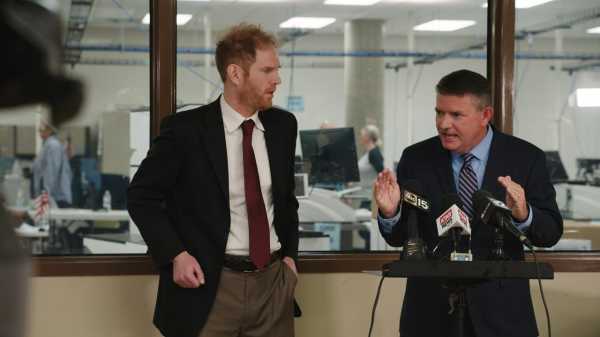
Save this storySave this storySave this storySave this story
Watch “Denial.”
The Maricopa County Board of Supervisors typically meets in a room in a building in downtown Phoenix, Arizona. The members sit in swivel chairs on a dais, in front of a blue wall emblazoned with the county seal. It’s the kind of banal municipal setting that, in recent years, has become the backdrop for theatrical scenes of turmoil and confrontation. “Those who make peaceful revolution impossible make violent revolution necessary,” a woman says, her voice heavy with emotion, during the public-comment portion of a Board of Supervisors meeting. Another woman uses her allotted time to quote the Bible: “Let them be as snails that dissolve into slime, and as those who die at birth who never see the sun. . . . The godly shall rejoice in the triumph of the right. They shall walk in the bloodstained fields of slaughtered, wicked men.” “You are the cancer that is tearing this nation apart!” a man with blond dreadlocks says, speaking in a menacing growl, as if he’s auditioning for a metal band. “Thank you,” Supervisor Bill Gates replies. Then he introduces the next speaker.
The New Yorker Documentary
View the latest or submit your own film.

The board members may seem like unlikely recipients of such vitriol. But, since Donald Trump narrowly lost Arizona in 2020, they have come under immense pressure as Maricopa County—the state’s most populous county and the source of the majority of its Democratic votes—has become a focus of those seeking to engineer a different outcome. That year, the filmmaker Paul Moakley watched from afar as a hostile crowd massed outside the Maricopa County Tabulation and Election Center while the ballots were being counted. Protesters wrapped themselves in Trump flags and carried AR-15-style rifles; on a bullhorn, the political commentator and conspiracy theorist Alex Jones warned of “another 1776.” Two years later, Moakley and Daniel Lombroso travelled to Arizona to follow Gates during the week before the 2022 midterm election, when election denial was, once again, in the spotlight. The result is “Denial,” a short film that explores the corrosive effects of election conspiracies through the experience of one elected official in one crucial jurisdiction.
The Board of Supervisors runs Election Day voting and certifies the results, and Gates may have seemed like a promising lever to press on. He’s a lifelong and loyal Republican who founded a teen-age Republican club while in high school and later became a member of the Federalist Society, the conservative legal organization. On Christmas Eve, 2020, when Gates was shopping with his family, he received a voice mail from Rudy Giuliani, who was serving as Trump’s lawyer. “Maybe we can get this thing fixed up,” Giuliani said. Gates refused to play along, and, together with his colleagues on the board, asserted that the election had been fair. This made them into targets. “Denial” depicts the attacks that arrived via social media, voice mail, and e-mail: accusations of treason, images of nooses. On the eve of the midterm elections, Gates and wife went into hiding after he received death threats.
Even without the fraught political context, running elections in Maricopa County is logistically daunting; the county has more registered voters than some states, spread across an area larger than Connecticut, Rhode Island, and Delaware combined. In a different context, “Denial” ’s shots of ballots clicking through machinery might be soothing evidence of a system running as designed. Instead, backed by a subtly ominous soundtrack, the effect is tense; the viewer is primed for something, anything, to go awry. The county’s election workers are under intense scrutiny, and every problem—such as the printer errors that caused delays at some Maricopa County voting centers in 2022—can be weaponized by those seeking to erode faith in the electoral process. “No, I would not say that this is a disaster,” Gates tells a reporter asking about the printer issue. “This is a hiccup.” But, in Maricopa County, there’s no such thing as a hiccup; coverage of the problem goes viral, and, at a subsequent meeting, the board is met with shouts of “traitor!”
Gates seems to be an unassuming figure (Steve Bannon, on his War Room podcast, disparagingly refers to him as “this Mister Rogers guy”) who meets the rage directed at him with a kind of bland politeness. But, under the patient close gaze of Moakley and Lombroso’s camera, a more complex portrait emerges. We sit with Gates during late nights at the office and hover behind him as he faces the news media. He spins a pen in his fingers; micro-expressions of pain flash across his creased face. During a car ride, he begins to tear up. “This, I can’t do on camera—or I can do it on your camera only. But I can’t do it on anyone else’s,” he says, wiping at his eyes. (Gates has since said that he’s been diagnosed with P.T.S.D., stemming from the threats he’s received in the past few years.)
After a number of election-denying candidates lost in 2022, some experts thought that the Republican Party would back away from the issue. But Trump’s insistence that the elections were rigged against him and his allies continues to be a potent rallying cry—and fund-raising call—for his base. Like a number of his fellow-Republicans who have defended election integrity, Gates opted not to run for reëelection this year. Instead, he will head up Arizona State University’s new Mechanics of Democracy Laboratory, which aims to teach a new generation how to run elections safely and fairly. One of his last tasks in office will be to help administer this year’s race; a number of the candidates have already begun to openly question the election’s legitimacy.
Urged on by Bannon, Trump supporters have sought out positions administering elections in Arizona and elsewhere. Earlier this year, the Trump campaign and the Republican National Committee pledged to send a hundred thousand volunteers and attorneys to battleground jurisdictions, such as Maricopa County, to insure “election integrity.” The final months of Gates’s time as a public official have been marked by anxiety. Sheriff’s deputies, undercover police officers, and SWAT-team members provide security at board meetings; he and his colleagues rehearse emergency evacuation drills. “It feels similar to the way it did in 2022,” Gates told me recently, with some trepidation. “We’ll see how it comes up in the end.”
Sourse: newyorker.com
